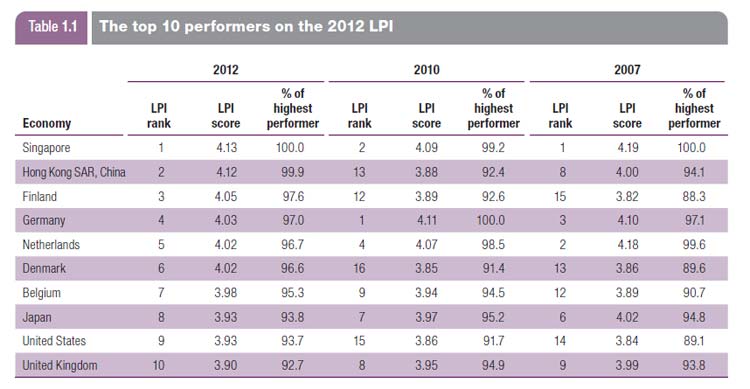From SCDigest's On-Target e-Magazine
- July 18, 2012 -
Global Logistics News: Third Logistics Performance Index from the World Bank Puts Singapore at Top of Rankings, While US Jumps to 9th Place
European Countries Dominate the Top 20; Growing Recognition of Tie Between Logistics Competence and Economic Growth
SCDigest Editorial Staff
For the third time, the World Bank has released a study of logistics effectiveness across more than 150 countries across the globe, in its recently released "Connect to Compete 2012" report.
SCDigest Says: |
 |
Interestingly, the US actually came in at number four in terms of logistics infrastructure, an area that often comes under criticism here from many logistics observers.
|
|
What Do You Say?
|
|
|
|
The 2012 ranking sees the logistics-focused city-nation of Singapore jump past Germany, the leader in 2010, to take the number one spot, while the US makes a strong move from number 15 globally in the 2010 report to the number 9 spot in 2012.
The first World Bank Logistics Performance Index (LPI) report was released in late 2007, followed by a similar effort in 2010. The reports are noteworthy both for their attempt to rank total logistics performance by country, and the strong recognition of the role that logistics plays in a country's overall economic performance and competitiveness.
"The LPI measures logistics efficiency, now widely recognized as vital for trade and growth. A country’s ability to trade globally depends on its traders' access to global freight and logistics networks," the report notes. "And the efficiency of a country's supply chain (in cost, time, and reliability) depends on specific features of its domestic economy (logistics performance)."
The LPI compares the trade logistics profiles of 155 countries and rates them on a scale of 1 (worst) to 5 (best). The ratings are based on 6,000 individual country assessments by nearly 1,000 international freight forwarders, who rate the eight foreign countries their company's serve most frequently. There is also some assessment by logistics service providers as to logistics conditions in their home countries. That seems like a pretty good methodology to us.
The LPI’s six components are:
• The efficiency of the clearance process (speed, simplicity, and predictability of formalities) by border control agencies, including customs.
• The quality of trade- and transport-related infrastructure (ports, railroads, roads, information technology).
• The ease of arranging competitively priced shipments.
• The competence and quality of logistics services (transport operators, customs brokers).
• The ability to track and trace consignments.
• The frequency with which shipments reach the consignee within the scheduled or expected delivery time.
Each of the 155 countries than receives as composite score by averaging the 1-5 ranking across each of the six criteria.
Singapore Takes the Global Honors
As mentioned above, Singapore moved from number 2 in 2010 to the top spot in 2012, with an average score of 4.13 across the six categories. Another city-nation, Hong Kong, was again rated separately even though it is obviously part of China, and came in at number 2 this year, a substantial rise from a 13 rank in 2010.
The rest of the top 10 is shown in the graphic below.

Source: World Bank 2012
The US made a strong move from number 15 in 2010 to cracking the top 10 this year, with an average score of 3.93.
Twelve of the top 20 nations are from Europe. Four are from Asia, joined by Canada, the United Arab Emirates (home of logistics hub Dubai City), and Australia, in addition to the US, in the top 20.
(Global Supply Chain Article Continued Below)
|